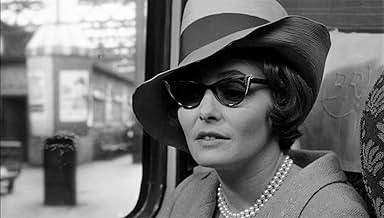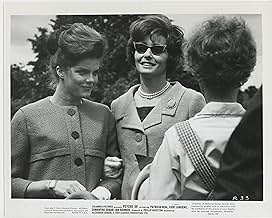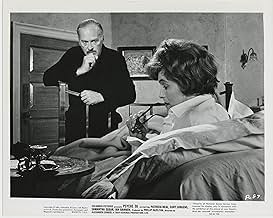Aggiungi una trama nella tua linguaIn London, the pregnant wife of an industrialist falls down the stairs, loses her sight and has no recollection of the events but suspects that a mentally traumatic experience prior to the f... Leggi tuttoIn London, the pregnant wife of an industrialist falls down the stairs, loses her sight and has no recollection of the events but suspects that a mentally traumatic experience prior to the fall caused her accident.In London, the pregnant wife of an industrialist falls down the stairs, loses her sight and has no recollection of the events but suspects that a mentally traumatic experience prior to the fall caused her accident.
- Regia
- Sceneggiatura
- Star
- Nominato ai 1 BAFTA Award
- 1 candidatura in totale
Curd Jürgens
- Eric Crawford
- (as Curt Jurgens)
Rex Garner
- Waiter
- (non citato nei titoli originali)
Pat Hagan
- Diner in Restaurant
- (non citato nei titoli originali)
Victor Hagan
- Diner in Restaurant
- (non citato nei titoli originali)
Aileen Lewis
- Lady in Teashop
- (non citato nei titoli originali)
Edward Malin
- Attendant in Men's Room
- (non citato nei titoli originali)
Jack Mandeville
- Man Exiting Lift
- (non citato nei titoli originali)
Louis Matto
- Waiter
- (non citato nei titoli originali)
Recensioni in evidenza
This film came on Turner Classic Movies recently, with the host mentioning that it was the film's debut on that channel, and the first film Patricia Neal made after winning the Oscar for Hud.
The story concerns a privileged upper-class blind woman named Alison (Neal), her husband Eric (Jurgens) and her younger sister, Robin (Eggar). At first all seems perfectly OK, given the circumstances, but bits of conversation are dropped here and there, darting looks are thrown here and there, and soon we realize that there is something lurking beneath the veneer of a privileged life. Alison, in the final stages of her second pregnancy, suffered a fall in her home that rendered her blind, though as she states early on, it's not that her corneas don't function, it's that her brain won't permit her to see images (paraphrasing here). Apparently this happened in 1959, hence the "'59" in the title: The story then takes place in 1964, five years after this fact, over a time period that seems to be about a month, or maybe two, when Robin re-arrives back into the lives of Eric and Alison after what appears to be a 5-year absence.
The black-and-white cinematography adds much to this film, such that I believe if it were in color, it would not be as effective. The language, dialogue and subject matter covered was ahead of its time, at least by U.S. standards, but stylistically, this matches a number of thrillers and socially-conscious dramas that came out of England in the early- to mid-1960s (e.g., Victim, Pumpkin Eater, etc.).
The first part of the film, set in London, sets up the story beautifully, and it isn't long before we start to realize that something's "up" - the carefully-worded dialogue, with certain key words and phrases omitted, or the glances of the blind Alison behind her sunglasses, to the beat of her words...you see that all that glitters is not gold, so to speak.
The second part of the film takes place at the characters' country house, located near a coastline; It is here that the set-up for what could be a riveting tale, as depicted in the first part of the film, loses steam and slows to a crawl, such that the conclusion is neither climactic nor satisfying; this is a shame, because it could have been done much better. Besides that, I do agree with the comments made by a previous observer, including that the grandmother doesn't seem quite grandmotherly (and actually, I'm sort of confused as to why this character is even in the picture).
Nonetheless, the acting is superb by all the leads, and particularly by Neal, who carries the film, in my opinion. Pay attention to every movement she makes, whether it's with her eyes, her head or her hands; listen intently to every syllable she utters, for it is through her character that we understand the real story of what has happened, or is happening, to these three people.
The movie is based on a book by the same name by Francoise des Ligneris, which is available online.
The story concerns a privileged upper-class blind woman named Alison (Neal), her husband Eric (Jurgens) and her younger sister, Robin (Eggar). At first all seems perfectly OK, given the circumstances, but bits of conversation are dropped here and there, darting looks are thrown here and there, and soon we realize that there is something lurking beneath the veneer of a privileged life. Alison, in the final stages of her second pregnancy, suffered a fall in her home that rendered her blind, though as she states early on, it's not that her corneas don't function, it's that her brain won't permit her to see images (paraphrasing here). Apparently this happened in 1959, hence the "'59" in the title: The story then takes place in 1964, five years after this fact, over a time period that seems to be about a month, or maybe two, when Robin re-arrives back into the lives of Eric and Alison after what appears to be a 5-year absence.
The black-and-white cinematography adds much to this film, such that I believe if it were in color, it would not be as effective. The language, dialogue and subject matter covered was ahead of its time, at least by U.S. standards, but stylistically, this matches a number of thrillers and socially-conscious dramas that came out of England in the early- to mid-1960s (e.g., Victim, Pumpkin Eater, etc.).
The first part of the film, set in London, sets up the story beautifully, and it isn't long before we start to realize that something's "up" - the carefully-worded dialogue, with certain key words and phrases omitted, or the glances of the blind Alison behind her sunglasses, to the beat of her words...you see that all that glitters is not gold, so to speak.
The second part of the film takes place at the characters' country house, located near a coastline; It is here that the set-up for what could be a riveting tale, as depicted in the first part of the film, loses steam and slows to a crawl, such that the conclusion is neither climactic nor satisfying; this is a shame, because it could have been done much better. Besides that, I do agree with the comments made by a previous observer, including that the grandmother doesn't seem quite grandmotherly (and actually, I'm sort of confused as to why this character is even in the picture).
Nonetheless, the acting is superb by all the leads, and particularly by Neal, who carries the film, in my opinion. Pay attention to every movement she makes, whether it's with her eyes, her head or her hands; listen intently to every syllable she utters, for it is through her character that we understand the real story of what has happened, or is happening, to these three people.
The movie is based on a book by the same name by Francoise des Ligneris, which is available online.
Those who think of Patricia Neal as a strong lady who can take care of herself, rent Psyche 59, a thriller. She's blind and completely dependent on the kindness of her husband, Curd Jurgens. Curd is a wonderful companion, waiting on her, showing her patience and kindness, and providing a personal maid to attend her when he's not around. Ian Bannen is also devoted to her, but since she's a married lady, he knows he can only be there for her as a friend.
The story would be interesting enough with just the above paragraphs as a synopsis, but it gets even more complicated and intriguing when Patricia's sister, Samantha Eggar, comes for a visit. Young, pretty, sexy, she's the kind of sister no one wants to have - let alone a blind woman who fears she's burdening her husband! Samantha constantly tries to entice Curd, and since he's a red-blooded man (and a very sexy one, if you've seen some of his other movies), he can't stay immune to her forever...
This thriller is entertaining, but I wouldn't really recommend watching it with your sister, or your husband if you have a sister. It has strong performances and a solid story, but it does have a European flavor that sometimes comes across as odd in America. Check it out to see what you think!
DLM Warning: If you suffer from vertigo or dizzy spells, like my mom does, this movie might not be your friend. During some of the flashbacks, there are some blurred swerving camera motions, and that will make you sick. In other words, "Don't Look, Mom!"
The story would be interesting enough with just the above paragraphs as a synopsis, but it gets even more complicated and intriguing when Patricia's sister, Samantha Eggar, comes for a visit. Young, pretty, sexy, she's the kind of sister no one wants to have - let alone a blind woman who fears she's burdening her husband! Samantha constantly tries to entice Curd, and since he's a red-blooded man (and a very sexy one, if you've seen some of his other movies), he can't stay immune to her forever...
This thriller is entertaining, but I wouldn't really recommend watching it with your sister, or your husband if you have a sister. It has strong performances and a solid story, but it does have a European flavor that sometimes comes across as odd in America. Check it out to see what you think!
DLM Warning: If you suffer from vertigo or dizzy spells, like my mom does, this movie might not be your friend. During some of the flashbacks, there are some blurred swerving camera motions, and that will make you sick. In other words, "Don't Look, Mom!"
Françoise des Ligneris's novel "Psyche '59" becomes a fine dramatic vehicle for the always-sympathetic Patricia Neal, here playing the wife of a wealthy businessman who is suffering from 'hysterical blindness' after a mysterious fall; when sister Samantha Eggar comes to live with her after a failed attempt at marriage, years-old tensions (both resentful and sexual) between Eggar and brother-in-law Curt Jurgens rise to the surface. As photographed in glossy black-and-white by the esteemed Walter Lassally, the picture is a shiny, classy piece of goods, yet director Alexander Singer takes an awfully long time to warm up. The plot (or rather, the point inherent to the plot) doesn't make itself known for at least an hour into the proceedings, while the pretty images and visual tricks eventually become a nuisance. Singer doesn't appear to wrap things up cohesively with his finale, yet it's actually his best bit: Neal's mental handicap and Eggar's need to be the proverbial thorn in the rosebush are dealt with in solely visual terms, and the silent emotions released are triumphant. A near-miss, but worthwhile for fans of psychological melodramas verging on soap opera. **1/2 from ****
Obviously based on a novel (and on a novel by a woman too). I saw this film on TV forty years ago and remembered only the menacing conversation the heroine has with her mother, but that was sufficient to make me want to take another look at it again.
Having enjoyed enormous critical acclaim a couple of years earlier with 'A Cold Wind in August', Alexander Singer blew all the clout he'd gained with that freak success in this elaborate, breaktakingly pretentious folly about the love lives of the fabulously wealthy; and found himself condemned to spend the rest of his career in television. But 'Psyche 59' has awarded him the last laugh, it exists.
A weird hybrid of 'The Miracle Worker' and 'The Pumpkin Eater' (both of which ironically starred Anne Bancroft, who replaced Patricia Neal when she nearly died following a series of debilitating strokes while filming '7 Women' in 1965, barely a year after she'd won an Oscar for 'Hud'). Had Ms Neal died this film would probably be better remembered today, and it would certainly make it an even more vivid experience to watch than it already is. She wears a succession of fabulous outfits devised by Julie Harris plus a pair of those chic sunglasses that blind people always do in the movies, the photography by Walter Lassally is stunning, and the restless score by Kenneth V. Jones creates a similar mood to that his music lent soon afterwards to Roger Corman's 'The Tomb of Ligeia'.
Definitely a film to be watched at least once.
Having enjoyed enormous critical acclaim a couple of years earlier with 'A Cold Wind in August', Alexander Singer blew all the clout he'd gained with that freak success in this elaborate, breaktakingly pretentious folly about the love lives of the fabulously wealthy; and found himself condemned to spend the rest of his career in television. But 'Psyche 59' has awarded him the last laugh, it exists.
A weird hybrid of 'The Miracle Worker' and 'The Pumpkin Eater' (both of which ironically starred Anne Bancroft, who replaced Patricia Neal when she nearly died following a series of debilitating strokes while filming '7 Women' in 1965, barely a year after she'd won an Oscar for 'Hud'). Had Ms Neal died this film would probably be better remembered today, and it would certainly make it an even more vivid experience to watch than it already is. She wears a succession of fabulous outfits devised by Julie Harris plus a pair of those chic sunglasses that blind people always do in the movies, the photography by Walter Lassally is stunning, and the restless score by Kenneth V. Jones creates a similar mood to that his music lent soon afterwards to Roger Corman's 'The Tomb of Ligeia'.
Definitely a film to be watched at least once.
Patricia Neal is a blind married woman, who's a victim of hysterical blindness, a term for blindness that is caused by psychological reasons, instead of anything really wrong with the eyes. It seems she was traumatized by something and refused to see things the way they really were. By way of how she relates to sister Samantha Eggar and husband Curt Jurgens, we enter her world. I read one review of this movie that called it turgid. I was never sure what turgid meant. And. sometimes the dictionary only tells you a synonym type of definition, with not enough of an explanation. But if turgid means to tell a story with exaggeration instead of subtlety. Then, I would agree to an extent, but I think this type of film, the story itself, the mood and setting, and its way of telling the story all go well together, up to a point. Things certainly get worse, before they get better. But I liked Ms. Neal's performance (as usual) and I particularly liked the ending, instead of getting a startling and shocking climax which the film feels like it's heading for. It may not be much on the whole, but I would watch this over and the family dynamic and dysfunction only adds to its appeal as a curiosity piece for the Patricia Neal fans.
Lo sapevi?
- QuizOriginally announced as Dana Wynter vehicle (in the Patricia Neal role).
- Citazioni
Mrs. Crawford: I'll read us another chapter of "The Red Sands of Mars."
- ConnessioniFeatured in Come to Silence with Samatha Eggar (2019)
I più visti
Accedi per valutare e creare un elenco di titoli salvati per ottenere consigli personalizzati
- How long is Psyche 59?Powered by Alexa
Dettagli
- Data di uscita
- Paese di origine
- Lingue
- Celebre anche come
- Das Verlangen
- Luoghi delle riprese
- Shepperton Studios, Studios Road, Shepperton, Surrey, Inghilterra, Regno Unito(studios: made at Shepperton Studios, England)
- Azienda produttrice
- Vedi altri crediti dell’azienda su IMDbPro
- Tempo di esecuzione
- 1h 34min(94 min)
- Colore
- Proporzioni
- 1.66 : 1
Contribuisci a questa pagina
Suggerisci una modifica o aggiungi i contenuti mancanti


























